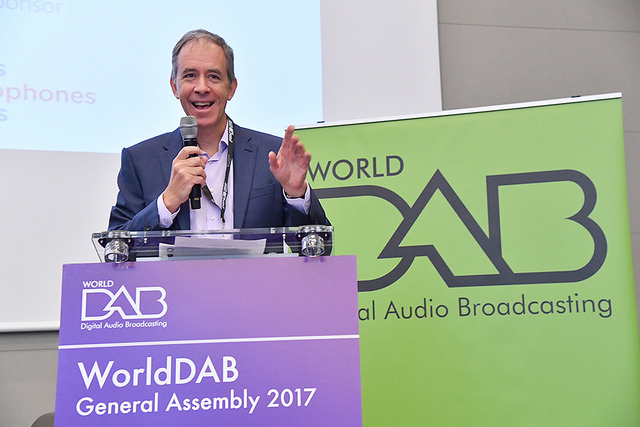WorldDAB comment on BBC digital switchover news
22.03.2018

There was much discussion at Radiodays Europe following statements from BBC Director of Radio and Music Bob Shennan on a future digital switchover. His full speech can be read online here. In this blog, WorldDAB President Patrick Hannon outlines WorldDAB’s view on digital radio’s progress in the UK.
“The BBC are understandably cautious about switching off FM and they have long argued for any transition to be listener-led – Bob’s announcement that the BBC wishes to retain FM for the time being confirms this position.
Looking forward, any transition to a digital-only future needs to be carefully planned and managed – and needs to involve stakeholders from across the radio ecosystem, including government, Ofcom, carmakers and receiver manufacturers.
Valuable lessons are being drawn from the Norwegian experience of switching off FM – with more to follow in the coming months. We expect these learnings to feed into the Government’s forthcoming review of the future of digital radio in the UK, which will take place once digital platforms account for more than 50% of radio listening.
It’s clear that the BBC remains fully committed to digital radio across all its platforms and we are pleased that listening over broadcast digital radio continues to grow year on year.
DAB is making very good progress in the UK. The radio industry and Government have invested in the infrastructure to deliver DAB coverage to over 98% of the population. 62% of homes now have access to a DAB set and 90% of new cars now have DAB as standard.
DAB is driving the growth of digital radio. According to the most recent listening results (RAJAR Q4 2017), DAB accounts for 73% of digital listening (36% of all listening), compared to online and apps at a 17% of digital listening (9% of all listening) and DTV at 10% of digital listening (5% of all listening). More households listen to DAB than watch SKY, use tablets or have an iPhone.
There are now 43 national stations available on DAB in the UK, compared to just eight on analogue, plus hundreds more local stations. DAB has allowed broadcasters to invest in content and launch new stations, not only delivering listeners unprecedented choice, but also allowing commercial broadcasters to remain robust in the face of increasing competition from online and digital platforms by offering a national proposition.
To quote from Bob Shennan at Radiodays: “I think it’s worth remembering also that new content is one of the great legacies of DAB. Look at the ingenious commercial radio brand extensions. Whether Kiss, Absolute, Talk, Capital or Heart. Look at the emergence of our own BBC 6 Music, a unique editorial offer, now attracting 2 and a half million weekly listeners and growing hours quarter on quarter.”
With the vast majority of new cars coming with DAB as standard, we are seeing particularly strong growth in automotive digital radio listening.
In-home, DAB is well-established, but there is scope to accelerate its growth. In the UK, we continue to sell many analogue-only receivers. Other countries face the same issue and are beginning to address this challenge. In December, Italy introduced legislation which will require all new radio receivers to have digital capability from 2020. In January, the French media regulator confirmed that DAB+ coverage will exceed 20% of the population, which in turn will trigger a French law which will require all new receivers to have DAB+. In February, the German Grand Coalition agreement outlined its support for similar legislation. We would strongly urge the UK to consider the benefits of such an approach.
We expect DAB to overtake FM listening within a relatively short period of time. Digital radio in the UK continues to go from strength to strength and has almost reached 50% of all listening. The BBC and commercial radio have seen considerable success from moving to digital and, at some point, the potential downsides of FM switch-off are likely to be outweighed by the benefits of moving to a digital-only future.
In the meantime, we are pleased that broadcasters remain committed to DAB and other digital platforms. Again, to quote Bob: “We are fully committed to digital”. This sentiment was echoed by Ashley Tabor OBE, the founder of Global Radio, who said: “We are delighted to fully support both DAB, and IP delivery of content. We have started many DAB stations on the D1 platform recently, invested in local DAB transmission and invested significant resources in new apps like The Global Player, home to all Global’s stations on mobile and connected devices.””
Posted in:
